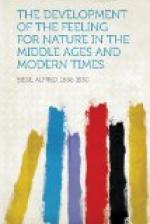His beautiful words on the inspiration of Nature shew his insight into her relation to the poet soul of the people:
Everything in Nature must be inspired by life, or it does not move me, I do not feel it. The cooling zephyr and the morning sunbeam, the wind blowing through the trees, and the fragrant carpet of flowers, must cool, warm, pervade us—then we feel Nature. The poet does not say he feels her, unless he feels her intensely, living, palpitating and pervading him, like the wild Nature of Ossian, or the soft luxuriant Nature of Theocritus and the Orientals. In Nature, the more varieties the better; for instance, in a beautiful country I rustle with the wind and become alive (and give life—inspire), I inhale fragrance and exhale it with the flowers; I dissolve in water; I float in the blue sky; I feel all these feelings.
Herder touched the lyre himself with a skilful hand. Thought predominated with him, but he could make Nature live in his song.[7] ‘I greet thee, thou wing of heaven,’ he sang to the lark; and to the rainbow, ’Beautiful child of the sun, picture and hope over dark clouds ... hopes are colours, are broken sun-rays and the children of tears, truth is the sun.’
In By the Sea at Naples he wrote:
A-weary of the summer’s fiery brand,
I sat me down beside the cooling sea,
Where the waves heaving, rolled and kissed
the strand
Of the grey shore, ...
And over me, high over in the air,
Of the blue skyey vault, rustled the tree
...
Queen of all trees, slender and beautiful,
The pine tree, lifting me to golden dreams.
In Recollections of Naples:
Yes! they are gone, those happy, happy
hours
Joyous but short, by Posilippo’s
bay!
Sweet dream of sea and lake, of rock and
hill,
Grotto and island, and the mirrored sun
In the blue water—thou hast
passed away!
and
When the glow of evening softly fades
From the still sea, and with her gleaming host
The moon ascends the sky.
Night is very poetic:
And
comest thou again,
Thou Mother of the stars and heavenly
thoughts?
Divine and quiet Mother, comest thou?
The earth awaits thee, from thy chalice
cup
But one drop of thy heavenly dew to quaff,
Her flowers bend low their heads;
And with them, satiate with vision, droops
My overcharged soul....
O starry goddess with the crown of gold,
Upon whose wide-spread sable mantle gleam
A thousand worlds ...
Silence divine, that filleth all the world,
Flowing so softly to the eternal shores
Of an eternal universe....
And in St John’s Night, he exclaims:
Infinite, ah! inexhaustible art thou, Mother Nature!
Like the rest, Herder suffered from the over-sensitiveness of his day. His correspondence with his fiancee shews this[8]; one sees Rousseau’s influence:




